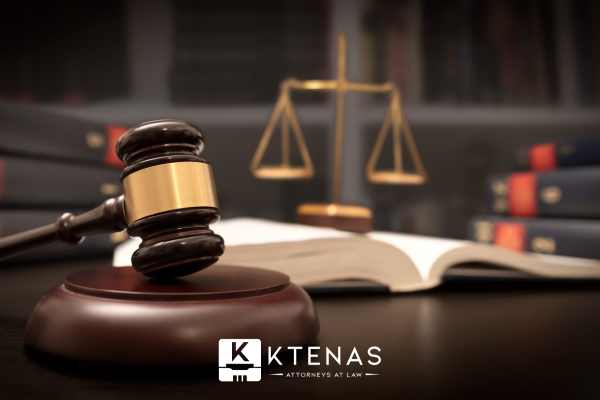Alternative Sentencing Options for Drug Charges in Chicago
2025-04-23T13:15:00
A plea bargain is when a defendant pleads guilty or no contest to a lesser criminal offense charge or reduced sentence. A guilty plea allows both parties to avoid the cost and uncertainty of a criminal trial.
The defendant may receive a more lenient sentence or charge, or the dismissal of certain criminal conviction charges. The process begins with the defendant’s attorney and prosecutor discussing a possible deal. The judge determines whether or not to approve the plea bargain.
Ktenas Law’s criminal defense attorneys can provide legal representation and support for a quicker resolution and a potentially less severe sentence, which are benefits of this process. We handle a wide variety of criminal charges, call us at (312) 756-8652 to start building your defense.
Plea charge bargaining involves an agreement between a prosecutor and a defendant, where the defendant pleads guilty in exchange for a more favorable plea bargain sentence. This may benefit both sides.
However, the plea bargaining process hides power imbalances. Disadvantaged parties struggle to receive justice. Research shows that economic, racial, and legal disparities influence plea deal outcomes. People of color with fewer resources often accept these types of plea bargain deals against their interests. This is to avoid maximum sentences.
Plea bargains don’t offer fairness to both parties. They benefit the prosecution and deny justice to many felony conviction defendants.
Entering into plea bargain negotiations is a decision that should not be taken lightly. It is important to understand the full consequences of this decision before committing to it, as there are both pros and cons in doing so.
One significant pro of entering into a plea agreement is that you may be able to receive more leniency in sentencing or the charge for your offense. The criminal justice prosecutor can agree during the plea deal negotiations to reduce the charges against you—for instance, reducing a felony to a misdemeanor—or reduce your sentence, resulting in probation rather than jail time.

In addition, if you are charged with another crime at some point, this reduced sentence may benefit you in court since your previous charge was reduced due to the plea agreement.
Another benefit of accepting a plea bargain is that it negates any uncertainty over who will win the case if it goes to trial. Jury trials can be costly and lengthy processes, and going through the criminal justice process does not guarantee success for either side; thus, avoiding the possibility of losing the trial without knowing who would have won is an advantage for some defendants seeking the best outcome for their case.
With these benefits in mind, you should weigh both sides seriously and determine the advantages that make sense for your particular situation when considering entering into a plea agreement.
A plea bargain is a legal agreement made between the defendant and the prosecution, in which the defendant agrees to plead guilty in exchange for lesser charges or a reduced sentence.
Time savings is a primary benefit of plea bargains. Both parties avoid lengthy criminal court proceedings, saving time and money. Defendants can move on with their life more quickly. The prosecution has a higher rate of success than if they pursued a trial. Plea bargains also save prosecutors time and resources.
A plea bargain is when a defendant admits guilt to a lesser offense in exchange for a reduced prison sentence. Sentence bargaining saves time and money on court proceedings and sentencing hearings. It also results in a less severe sentence than if convicted in court.
Plea bargains are beneficial for serious charges and long sentences. In these instances, admitting guilt to a lesser charge and agreeing to a reduced sentence may be the best choice.
Plea bargains are agreements between defendants and prosecutors. Defendants agree to an admission of guilt or no contest for a lesser charge and receive lighter sentences or other benefits in exchange. This type of deal agreement saves time and money associated with trials.
Financially, it reduces legal fees for the defendant and preparation costs for the prosecution. Both parties can benefit from reduced fines and other financial penalties as part of the agreement.
Entering into a plea bargain can have serious collateral consequences that should be carefully considered before agreeing. One of the most significant downsides to pleading guilty is the loss of your right to plead innocent or go to trial.
This means if you are completely innocent of the crime, but accept a plea deal in exchange for concessions, you are essentially admitting guilt and accepting responsibility for something you may not have done.

Additionally, while a plea arrangement may be seen as beneficial due to reduced charges or shorter sentence lengths, it’s important to remember that all aspects of the plea bargain process—including any fines or other conditions that must be met for the agreement to stay valid—will need to be presented in open court for it to take effect.
As such, even when facing serious criminal charges and pressure from prosecutors, defendants should carefully consider all the pros and cons associated with entering into a favorable plea deal before making their final decision.
A plea bargain is an agreement to resolve a criminal case whereby the defendant agrees to plead guilty or a no-contest plea in exchange for a reduced charge or sentence. This process allows the court system to save time and money and provides defendants with an opportunity to receive a lesser penalty than they would have if they went to trial.
However, when entering into a plea bargain, defendants are often required to give up certain constitutional rights, such as the right to a trial and the right to remain silent. Additionally, plea bargains can have long-term consequences that may not be immediately apparent, including decreased employment opportunities due to having a criminal record or difficulty obtaining loans or housing due to the stigma associated with a conviction.
A plea bargain is an agreement between a defendant and a prosecutor in which the defendant agrees to plead guilty or no contest to certain charges in exchange for lesser penalties than would be imposed if the defendant were found guilty after a trial. Plea bargains are a common practice in criminal cases and can provide significant benefits to both sides.
However, by agreeing to a plea bargain, defendants also waive some of their constitutional rights, including the right to a trial by jury. As such, it is important for defendants to fully understand the implications of a plea bargain before agreeing.
A plea bargain is an agreement between a criminal defendant and the prosecution in which the defendant pleads guilty to a lesser crime or reduced charges in exchange for a lighter sentence than they would have received if convicted of the original charge. This type of arrangement is often used to spare both parties from the cost and time of going through a lengthy trial.

For some crimes, however, harsher punishments may be imposed upon those who enter into a plea bargain. For example, in many states, individuals charged with certain sex crimes and domestic violence crimes may face mandatory minimum sentences if they choose to accept a plea deal, even if the sentence is lower than what would have been imposed after a trial.
Additionally, for some violent crimes, plea bargains have been known to result in longer jail sentences than the defendant would have received if they were found guilty at trial.
A plea bargain is a deal between a prosecutor and a defendant where the defendant pleads guilty to a lesser charge. In exchange, the defendant will receive more favorable sentencing terms compared to if they were convicted of the original charges. This can benefit defendants by reducing their potential jail time or even avoiding a criminal record.
Defendants may face pressure to accept a plea bargain that may not be in their best interest. This may occur due to their lack of familiarity with the legal system or limited financial resources to cover court fees and attorney’s fees. Therefore, it is important for defendants to carefully evaluate all aspects of a plea bargain before making a decision.
A plea bargain is a legal agreement between the prosecution and defense in which the defendant agrees to plead guilty or no contest to a criminal charge in exchange for reduced charges, lesser penalties, or dismissal of some of the charges. It is a means for both parties to avoid a lengthy trial process and is commonly offered by the prosecution as an incentive for defendants to plead guilty and receive a reduced sentence.
Before agreeing to a plea bargain, defendants must understand its implications. They should consider all aspects, including future employment opportunities and the ability to obtain loans and housing. It’s important to note that mandatory minimum sentences may apply to certain crimes even with a plea deal. Contact us today for more information.

2025-04-23T13:15:00

2025-04-07T11:50:40

2025-03-24T11:55:03

